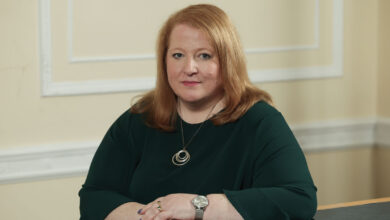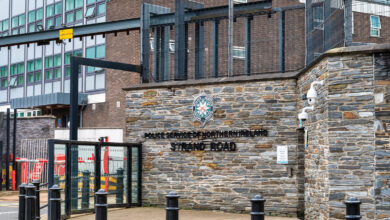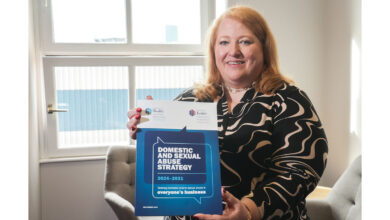Fostering a strong, independent, and diverse Bar

Following their election as Chair of the Bar Council, Donal Lunny KC, and Vice Chair, Denise Kiley KC, talk to David Whelan about their ambitious two-year programme and efforts to foster a more modern, effective, and efficient justice and legal system.
Meeting on the day when criminal barristers in Northern Ireland announced a four-week withdrawal from legally-aided Crown Court cases until the end of January 2025, both Lunny and Kiley can testify to a busy few months since taking up their respective posts in September 2024.
The fallout of the ongoing criminal legal aid crisis is just one element of the work undertaken by the Bar Council – a body of 20 practising barristers, which is responsible for the governance, regulation, and representation of the profession.
As Chair and Vice Chair, Lunny and Kiley, like all other elected members of the Bar Council, operate on a voluntary basis, while also maintaining busy careers as civil practitioners.
Explaining his rationale for seeking the post, Lunny, who has previously held the roles of Vice Chair and Bursar in the Bar Council, says: “The Bar Council has been a longstanding advocate for a positive, proud, and strategic vision for justice. Barristers champion the rule of law, serving the administration of justice and public interest. The existence of a strong, independent, and diverse Bar is crucial to the effective and efficient administration of justice and upholding the rule of law.
“I have been an elected member of the Bar Council since 2003 and I believe that through my experience I could make a meaningful contribution as Chair. Many of the challenges barristers are currently facing are longstanding and I feel I can bring my experience to bear in trying to address these, alongside a very capable and talented team.”
Kiley, who has taken on the Vice Chair post in what is her second term as an elected representative of the Bar Council, says: “I think it is a privilege to do the job we do and it is an even greater privilege to represent the profession through Bar Council. My first term was an eye opener for me in terms of the extent of the issues the Bar Council was taking on, on behalf of all members, and I felt that I could and wanted to contribute to that.”
Legal aid
While the Bar Council is representative of all its members, across civil, criminal, and family law, understandably, the early months of the Chair and Vice Chair’s terms have been largely dominated by legal proceedings the Bar Council is engaged in to challenge the Department of Justice’s policy to delay payment to legal practitioners for work completed under the legal aid system.
In November 2024, the Criminal Bar Association began a process of withdrawal of services from the Crown Court. An initial one-day strike in late 2024 has been followed up by a four-week withdrawal until the end of January 2025.
“Access to justice is in crisis, with the system of legal aid close to breaking point, due to lengthy payment delays and fees that have remained static since 2005,” Lunny explains, setting out that the scale of the action is representative of the current severe pressures on the legal and justice system.
“The system of criminal legal aid in the Crown Court has been chronically underfunded for a long time, a prime example being that the fees payable to barristers in the Crown Court, under legal aid, have not increased in 20 years.

“Despite the challenges that lie ahead for our profession, the strength of the Bar of Northern Ireland lies in our collegiality, our independence, and our commitment to justice.”
Chair of the Bar Council, Donal Lunny KC
“What that means is that when you factor in inflation, the fees offered for criminal legal aid in the Crown Court today are worth less than half what they were in 2005. That is despite the fact that the advent of digital evidence means that cases are becoming much more complex and more time consuming.”
Kiley explains that there are also concerns about the timely payment of these fees. “Routinely, these barristers will wait at least three to four months for payment once a case is concluded and their fee is submitted. Long hours, increasingly complex cases, unfair remuneration, and payment delays have coalesced to make legally aided criminal work an unviable practice area for an increasing number of legal professionals, particularly younger barristers.
“This causes an access to justice challenge for the whole of society.”
In 2023, against a backdrop of squeezed one-year successive budgets for the Department of Justice, the Criminal Bar Association and Bar Council, engaged with the Department to commission a fundamental review of the criminal legal aid framework led by retired judge Tom Burgess.
Completed in August 2024, a more than three-month delay by the Department in publishing the Burgess report led to the Bar Council stating that the “goodwill of the profession” had been “exhausted”.
At the time, the Department said that it was considering the report and stressed its ongoing work to secure a more sustainable budget to meet the current pressures. It added that in 2023/24, the Legal Services Agency paid out circa £114 million to legal professionals, the highest level of payment in the history of legal aid. Lunny and Kiley point out that the high level of the total spend on legal aid is in part reflective of a justice system that is working far in excess of its normal capacity in order to process Covid-era backlogs.
Subsequently, in December 2024, the Department announced the wide-ranging Enabling Access to Justice reform programme, however, the Bar Council’s assessment is that through the programme, the Department “has chosen to ignore the scale of the access to justice crisis across Northern Ireland and has instead elected to focus upon ideologically driven policy experimentalism”.
“The Department of Justice’s wide ranging reform programme shows a dismissive approach to the access to justice crisis that prevails at present. The number one priority for the Department must be to stabilise a system of legal aid which is at serious risk of collapse,” states Lunny, who believes the system must be stabilised before the Department embarks upon a programme of reform.
In relation to the Burgess report, Lunny says: “The Department has been, we think, very cynically selective in their approach to those recommendations. We query what the purpose of engaging a trusted, independent expert of the Department’s choosing, only to adopt an a la carte approach to the evidence-based recommendations.”
Outlining a concern, that without the quick introduction of a significant interim uplift in Crown Court fees, making it viable for barristers in Northern Ireland to continue to carry out legal aid work, the region could be heading towards a two-tier, American-style system, Vice Chair Kiley says that a system, where only people with the means get the best criminal representation, must be avoided.
“Something we have been trying to highlight to the Department is that it is within everyone’s interests – society and the justice system generally – for barristers to receive fair rate of pay so that they can properly fulfil their role. Alongside increased potential miscarriages of justice associated with challenges to representation, other implications include further delays, which impacts everyone who encounters the criminal justice system.”
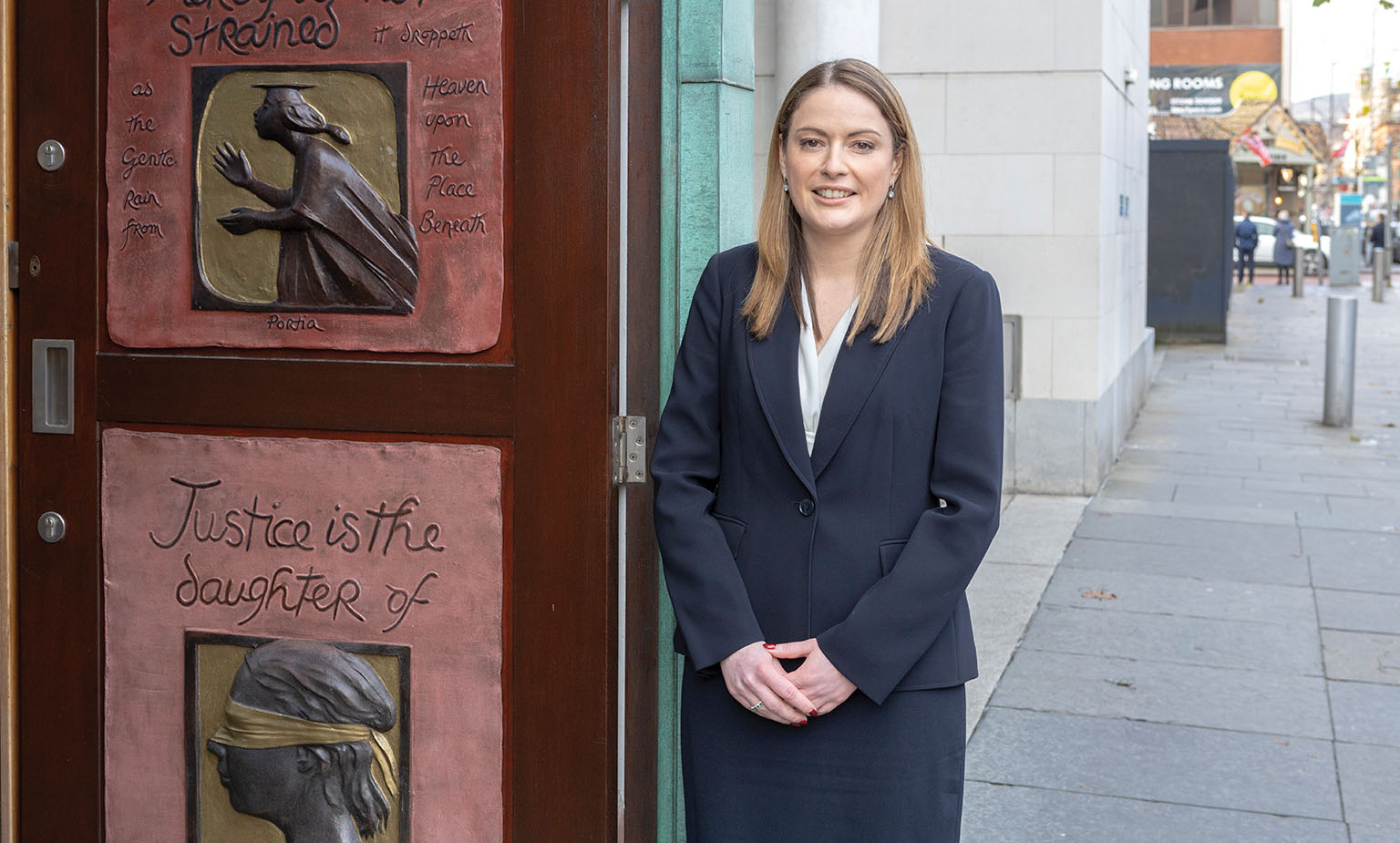
“It is important for us that we do not see resolution as simply resolution of the strike. It needs to be a resolution to the access to justice crisis.”
Vice Chair of the Bar Council, Denise Kiley KC
Asked about the ongoing relationship with the Department, Kiley highlights that barristers, by their very nature, are highly skilled at negotiating, compromising, and solving problems.
“However, it is important for us that we do not see resolution as simply resolution of the strike. It needs to be a resolution to the access to justice crisis,” she states.
“We have made it very clear to the Department that our door is always open because we want a resolution. I would hope that any resolution would involve repairing the relationship between the Bar and the Department. The Department can take steps to repair that relationship and to recognise the value that the bar brings to the criminal justice system because I believe we can work in partnership to improve the justice system.”
Diversity
Beyond the current legal aid crisis, both Lunny and Kiley have an ambitious programme in their aims to “protect and enhance the virtues of our independence as a Bar, and as individual barristers”.
Kiley is an exemplar of ongoing work to improve diversity within the Bar. In 2024, the Vice Chair was one of 12 women called to the Bar, a threefold increase from the previous call in 2020.
“The Bar Council has made a concerted effort to promote diversity at the Bar and support female practitioners as they serve the public interest in the most challenging of legal matters whilst also navigating the challenges of self-employment,” she explains.
“The record number of females called to the Senior Bar in 2024 is a testament to the work of previous Bar Councils but we understand that there is more work to be done and are keen to contribute to that journey.”
Importantly, Kiley explains, a diverse bar goes beyond gender. “A truly diverse profession must be reflective of the society we serve. As Northern Ireland becomes more culturally diverse, so too must the barrister profession.”
Expanding on this, Lunny says that improved social-economic diversity of the Bar is an aspiration for their term.
“Traditionally, our Bar has always enjoyed a greater level of diversity than analogous Bars in England and Wales. Being called to the Bar in Northern Ireland involves a candidate-blind exam and ensures that access to the Bar is completely based on merit. It is a much better system that ensures our Bar is open to any hard-working, bright young people, who meet the necessary academic standards. That is something we do not want to lose.”
Highlighting current challenges for young aspirational barristers which range from rising university fees to rent affordability in Belfast, Lunny explains that the Bar Council is progressing a number of programmes with Queen’s University Belfast, namely the Brighter Future project and the Pathways project, aimed towards secondary level school pupils in areas of high levels of deprivation.
Independence
On another priority, Kiley says: “We will seek to protect and enhance the virtues of our independence as a Bar and as individual barristers and increase wider society’s understanding of the inextricable links, not only between our independence and that of the judiciary – but between our independence and the principle that everyone is entitled to access to justice, a principle which is central to trust in our legal system and the rule of law.”
As an independent referral Bar, the Vice Chair and Chair believe that the offering of “fearless and fair representation” needs to be championed and protected, particularly amidst proposals on reform for the wider justice system.
Lunny adds: “We are committed to working collaboratively with the judiciary, the Courts Service, the Department, and others to deliver a more modern, more effective, and more efficient justice and legal system. However, we are determined to ensure that any changes that occur do not imperil the core principles of access to justice, fairness, and the rule of law.”
Lunny explains that the importance of this independence was recognised during the joint hosting of the World Bar Conference by the Bar Council and the Bar of Ireland in summer 2024. Attended by a host of countries with similar legal systems including Australia and New Zealand, a panel discussion of the Chief Justices stressed the importance of the Bar’s independence to the whole legal system.
A critical part of the Bar Council’s independence is robust self-regulation. While some jurisdictions have drifted towards a system whereby the State acts as a regulator, both the Chair and Vice Chair are in strong agreement on the need to retain that independence.
In 2024, the Bar Council introduced a code of conduct reform that saw the standard of proof for professional misconduct changed from the criminal standard to the civil standard. This, Lunny explains, is evidence of a desire to improve the system of self-regulation and make the system even more robust.
“The Bar of Northern Ireland is also a proactive and responsible regulator of the barrister profession. We have been making positive changes to our existing complaints procedures and are at advanced stages of preparation for the Legal Complaints and Regulation Act.”
Concluding, Kiley says that the Bar Council’s primary priority is finding a resolution to the current criminal legal aid crisis, and more broadly, the access to justice crisis, however, she hopes that for the remainder of the term, the Bar Council can continue to make strides in addressing gender and socioeconomic diversity within the Bar.
Lunny adds: “I am proud of the Bar’s efforts and initiatives to embrace modernisation to date. Nothing stands still, and legal practice continues to be shaped by technological advances and the emergence of new areas of law. No facet of our profession should be left behind.
“Despite the challenges that lie ahead for our profession, the strength of the Bar of Northern Ireland lies in our collegiality, our independence, and our commitment to justice. If we remain faithful to those values, we are confident that the Bar of Northern Ireland will continue to serve the public by playing an important role in a stable, prosperous, and just society.”
|
Donal Lunny, Chair Donal Lunny KC has been an elected member of the Bar Council since 2003 with practice specialism in the areas of personal injury, land law, public inquiries, and judicial review. Between 2017 and 2020 he was one of two junior counsel to the Public Inquiry into the Northern Ireland RHI Scheme. Denise Kiley, Vice Chair Denise Kiley KC was called to the Bar of Northern Ireland in 2008 and to the Inner Bar in 2024. She has extensive experience of practice in public law. She specialises in judicial review, particularly in the areas of education, planning, local government, and constitutional law. Between 2021 and 2024 she acted as junior counsel to the Muckamore Abbey Hospital Public Inquiry. |
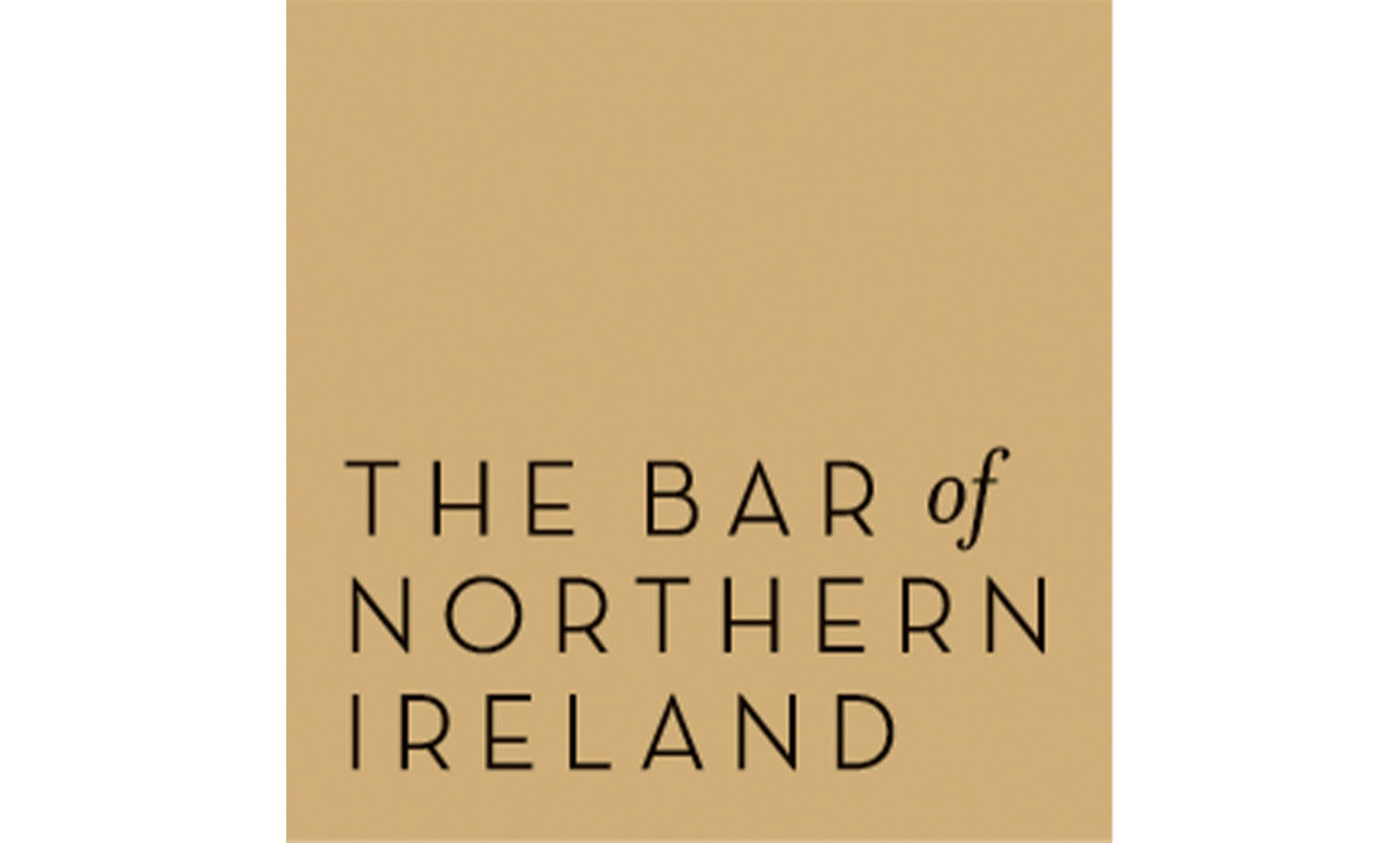
T: +44 (0)28 9024 1523
E: contact@barlibrary.com
W: www.barofni.com
X: @TheBarofNI
Linkedin: The Bar of Northern Ireland

